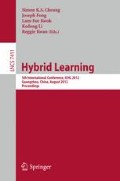Abstract
Most universities today enhance their classroom teaching and learning with some kind of online learning system or learning/course management system, as it is commonly believed that instructors can better manage their courses and students through the systematic delivery of course material and tight monitoring of student progress and that students learn better at their own pace and with easy access to learning materials and more frequent interaction with fellow learners. However, individual differences among students are always a concern to both educational academics and practitioners. A mismatch between learning styles and instructional methods can create conflicts that affect cognition, affect, and behavior during the learning process. The unified implementation of an online learning system may therefore be less effective for all individual learners than previously thought. To devise more effective institutional implementation strategies in online learning system deployment, a better understanding of the determinants that affect the use of these systems is urgently needed. In this study, the authors review the cognitive learning style scales that have been adopted in previous research and present the results of a seven-year study of the cognitive learning styles of undergraduate freshmen at a local university in Hong Kong. They also discuss the system’s log usage patterns in the first semester in which these students were enrolled. The results identify significant differences between cognitive learning styles and login (F = 32.25, p < 0.001)/download (F = 23.59, p < 0.001) patterns, although no significant differences were found in forum usage. The implications of and possible reasons for these findings are discussed.
Access this chapter
Tax calculation will be finalised at checkout
Purchases are for personal use only
Preview
Unable to display preview. Download preview PDF.
References
Hiltz, S.R.: The virtual classroom: Learning without limits via computer networks. Ablex Publication (1994)
Ma, W.W.K.: E-learning system acceptance and usage pattern. In: Teo, T. (ed.) Technology acceptance in education: Research and issues, pp. 201–216. Sense Publishers (2011)
Ma, W.W.K., Clark, T.H.K., Li, P.: Cognitive Style and Acceptance of Online Community Weblog Systems. International Journal of Communications, Law and Policy (Autumn 11, 2006)
Ma, W.W.K.: Cognitive learning styles and academic performance in the online learning environment. In: Kwan, R., Wang, F.L. (eds.) Hybrid Learning: The New Frontier, 2nd International Conference on Hybrid Learning, pp. 26–37. City University of Hong Kong (2009)
Coffield, F., Moseley, D., Hall, E., Ecclestone, K.: Learning Styles and Pedagogy in Post-16 Learning: A Systematic and Critical Review. Learning and Skills Research Centre (2004)
Messick, S.: Personality consistencies in cognition and creativity. In: Messick, S. (ed.) Individuality in Learning, pp. 4–22. Jossey Bass (1976)
Lynch, D.: Is the brain stuff still the right (or left) stuff? Training and Development Journal, 23–26 (February 1986)
Witkin, H.A., Moore, C.A., Goodenough, D.R., Cox, P.W.: Field-dependent and field-independent cognitive styles and their educational implications. Review of Educational Research 47, 1–64 (1977)
Goodenough, D.R., Witkin, H.A., Lewis, H.B., Koulak, D., Cohen, H.: Repression, interference and field-dependence as factors in dream forgetting. Journal of Abnormal Psychology 83, 33–44 (1974)
Kubes, M.: Cognitive style and interpersonal behavior: The Kirton Adaptation-Innovation and Schutz’s FIRO-B Inventories. Psychology: A Journal of Human Behavior 29, 33–38 (1992)
Lindsay, P.: Counselling to resolve a clash of cognitive styles. Technovation 3, 57–67 (1985)
McHale, J., Flegg, D.: How calamity Jane was put in her place. Transition, 14–16 (November 1985)
Richards, T., Moger, S.: Felix and Oscar revisited: An exploration of the dynamics of a real-life odd couple work relationship. Journal of Applied Behavioral Science 30, 108–131 (1994)
Tullet, A.D.: The Adaptive-Innovative (A-I) cognitive styles of male and female project managers: Some implications for the management of change. Journal of Occupational & Organizational Psychology 69, 359–365 (1995)
Lawrence, G.: People types and tiger stripes: A practical guide to learning style. Center for Applications of Pyschological Type (1993)
Kirton, M.: A theory of cognitive style. In: Kirton, M. (ed.) Adaptors and Innovators, pp. 7–27. Routledge (1989)
Allinson, C., Hayes, J.: The Cognitive Style Index: A Measure of Intuition-Analysis for Organizational Research. The Journal of Management Studies 33(1), 119–135 (1996)
Nunnally, J.C., Bernstein, I.H.: Psychometric Theory. McGraw-Hill (1994)
Allinson, C.W., Armstrong, S.J., Hayes, J.: The Effects of Cognitive Style on Leader-Member Exchange: A Study of Manager-Subordinate Dyads. Journal of Occupational and Organizational Psychology 74(2), 201 (2001)
Agor, W.H.: Intuitive management: Integrating right and left brain management skills. Prentice-Hall (1986)
Author information
Authors and Affiliations
Editor information
Editors and Affiliations
Rights and permissions
Copyright information
© 2012 Springer-Verlag Berlin Heidelberg
About this paper
Cite this paper
Ma, W.W.K., Sun, K., Ma, J. (2012). The Influence of Cognitive Learning Styles on the Use of Online Learning Environments. In: Cheung, S.K.S., Fong, J., Kwok, LF., Li, K., Kwan, R. (eds) Hybrid Learning. ICHL 2012. Lecture Notes in Computer Science, vol 7411. Springer, Berlin, Heidelberg. https://doi.org/10.1007/978-3-642-32018-7_21
Download citation
DOI: https://doi.org/10.1007/978-3-642-32018-7_21
Publisher Name: Springer, Berlin, Heidelberg
Print ISBN: 978-3-642-32017-0
Online ISBN: 978-3-642-32018-7
eBook Packages: Computer ScienceComputer Science (R0)

